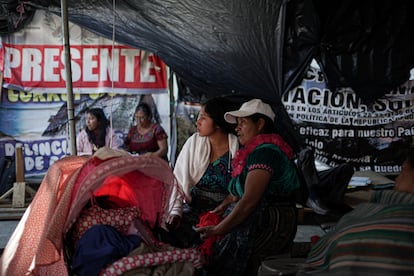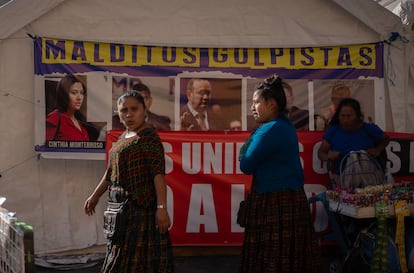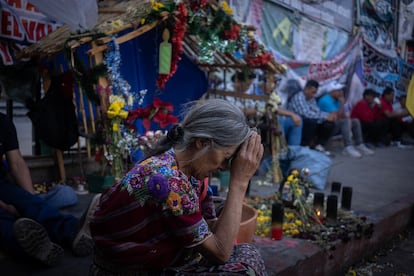More than 100 days of indigenous resistance for Bernardo Arévalo to govern Guatemala
The indigenous peoples have led a powerful movement to defend democracy against judicial attacks to try to invalidate the elections. The government now has the challenge of not leaving them behind


It’s almost 3:30 p.m. on Thursday and José López, a resident of Totonicapán, uses a megaphone to encourage the representatives of the indigenous peoples who are holding a sit-in in front of the Public Ministry of Guatemala. It is day 102 of the resistance. Today it is the turn of the members of their community. They have traveled the almost 125 miles that separate their territory from the capital to stand guard in front of the gray cement mass that serves as an operations center for those they accuse of undermining democracy in his country: the attorney general, Consuelo Porras, the prosecutor Rafael Curruchiche, and judge Fredy Orellana.
The three have been accused by the elected president, Bernardo Arévalo, of perpetrating a coup d’état through judicial attacks to prevent his inauguration. With just a few hours left before he takes office, the rally has a festive atmosphere. The goal of a peaceful transfer of power and preserving democracy in Guatemala seems to be getting closer and closer. But let no one be confused, the cantonal authorities present at the sit-in repeat over and over again with their staffs of office that distinguish them: this is an apolitical movement.
“We have always said it: we are not supporting any party, not even a president, we support the rule of law and democracy so that our country can breathe. We don’t need anything to be given to us. We just want to work, we just want to be given the conditions to work, and that is what we demand from any government,” López says. And he gives way to a group of students who delight the audience with a double marimba concert: seven play the national instrument and two others support with maracas and percussion. In this movement that promotes the common good, nothing is understood without teamwork.
The powerful movement was started by the authorities of the 48 cantons of Totonicapán. The indigenous organization with a long history of peaceful resistance, which represents around 140,000 people — mainly the K’iché Mayan people of western Guatemala — began on October 2. Its first acts were the seizure of town squares and setting up a road blockade and they were quickly joined by other communities in the country, inhabited by other Mayan peoples — such as the Ixil, the Kaqchikel, and the Mam — as well as the Xinka people.
Although all the assemblies’ decisions are made by consensus, Luis Pacheco — president of the 48 Cantons of Totonicapán in 2023 — became the most recognized leader of these protests last year. As he explains, what moved his community to begin the strike were the “attacks” they saw on the part of the Public Ministry to undermine the results of elections that had been duly audited.
Indigenous resistance at the heart of political power
After lifting the road blockade, on November 20, the 48 Cantons decided to move the protest to the headquarters of the Public Ministry. Gladys Tzul, a doctor in Sociology originally from Totonicapán, points out that the intervention of the prosecutor’s office in the electoral results “adds to a string of attacks against indigenous communities.” For this reason, when they saw the sequestration of the ballot boxes, the indigenous movements responded in unison to the call for protest from all parts of the country.

“The Public Ministry acts as a hinge, like a kind of a gear between the three powers: the executive, the legislative, and the judicial. And it is also the mechanism that gives way in administrative or research terms to the extractive model [of the exploitation of natural resources] which we are experiencing and that has caused deaths, anxiety, displacement, migration, and imprisonment” in the communities, he says in an interview with EL PAÍS.
In the capital, the different organizations have established a rotating system to maintain the sit-in outside the prosecutor’s office, where protesters from the assigned towns arrive every day. This Thursday, it is the turn of the authorities from zone four of Totonicapán, among whom is the communal mayor Solomon Tax. “There has been fatigue, times of tension, of provocation, but one of our slogans is always that our protests be peaceful, without becoming disorderly so that none of our authorities suffer harassment,” he explains in a group with other community leaders while the marimba plays.
In the more than 100 days of protest, the indigenous movements have had to overcome attempts at eviction and rejection from certain Guatemalans, but the population has rallied to them en masse and brought them food, tarpaulins, and blankets to withstand the cold of the night. Volunteers such as Lesvi Yanes, a 51-year-old woman from Jutiapa, also come to the sit-in. Yanes cooks dishes for the protesters with food donated to the indigenous resistance movements.
“There are only three days left!” says Yanes as she passes by a sign that counts down the change of government located at the food stand. She does say she is a supporter of the Semilla Movement and supported the president-elect in the second round of the elections. “We believe in change and, if they are doing all this so that [Arévalo] does not take office, it is because he is different. Otherwise they would already be celebrating,” she says, pointing to the Public Ministry building.
“This has been kept up due to the public’s unconditional support,” Tax acknowledges. “We have also had opposition, of course, but more people have joined us. “There were up to 189 lockdowns across the country at [the protest’s] peak.”
Gladys Tzul believes that this indigenous resistance movement is going to be a watershed moment for her country, and that the Guatemalan political system has been shaken by the local government system. “Serving the people means defending the collective will and defending dignity. It is not just for a salary,” he points out. “I feel that this trained and politically educated the population of the capital, which is not indigenous, and belongs to a certain middle class. It also made a lot of sense among the working classes that live in the cities that also have organized political and assembly structures.”
Furthermore, this resistance has positioned indigenous movements as interlocutors with different sectors — from politics to business — and they have also been taken into account by actors from the international community, who have been unusually active in responding to the Guatemalan crisis. “We have had dialogues in which a better solution or an alternative has been sought to avoid creating conflicts and so that they do not believe that indigenous peoples do not know where we are going,” says Pacheco, the former president of the 48 cantons. “Clearly it has been widely accepted and that is why there is also support, because in the end it has been shown that it is a defense of an inherent right for all people and not just one sector of society.”
Challenge: the government does not ignore the indigenous peoples once again
This resistance has brought the struggle and the indigenous movements’ ways of seeking the common good to the heart of Guatemalan politics, and it also presents a challenge for the new Arévalo Government. It must not leave behind the peoples who, according to the last census, represent 42% of the more than 17 million Guatemalans.

“We expect a lot from Arévalo, but the main expectation is that now there really is an inclusive government for indigenous peoples, and that they occupy the spaces that belong to them. And that the president governs with the indigenous people who are the people who managed to get him into office,” says Pacheco.
However, the president-elect has started the counter in the negative, as he himself acknowledged when he presented the 14 members of his cabinet, among whom there is only one indigenous woman, the Minister of Labor and Social Welfare, Miriam Roque. Arévalo acknowledged that “they were indebted to the [country’s] multiculturalism,” but showed his intention to bring these peoples into other levels of government.
After meeting his government team, the Board of Directors of Communal Mayors of the 48 Cantons of Totonicapán in a statement regretted that Arévalo had not taken advantage of the historic opportunity to integrate an inclusive Cabinet with officials from the peoples that make up the country — Mayan, Garifuna, and Xinka — “something vital for the implementation of real public policies that adhere to the living conditions” of each of the ethnicities.
For Tzul, Arévalo’s team “must have the ability to respect heterogeneous autonomy.” “This is a country of communities and this uprising has shown us that. But the fact that the rule of law has been preserved, democratic order has not been broken, and this transition has been able to go ahead has to do with the defense of the common good that the authorities have made,” he says.
At the sit-in, the indigenous authorities prefer to give Arévalo a vote of confidence. “Logically, these types of decisions make us a little sad,” says Salomon Tax regarding the composition of the Cabinet. “We cannot judge something that has not started, but we are going to be monitoring every movement and, if the results are not forthcoming, we are going to demonstrate.” For the moment, their plan is to maintain the protest until January 15, one day after the inauguration. “If everything goes as it should, we will be celebrating that we met the objectives of maintaining democracy in the country.”
Sign up for our weekly newsletter to get more English-language news coverage from EL PAÍS USA Edition
Tu suscripción se está usando en otro dispositivo
¿Quieres añadir otro usuario a tu suscripción?
Si continúas leyendo en este dispositivo, no se podrá leer en el otro.
FlechaTu suscripción se está usando en otro dispositivo y solo puedes acceder a EL PAÍS desde un dispositivo a la vez.
Si quieres compartir tu cuenta, cambia tu suscripción a la modalidad Premium, así podrás añadir otro usuario. Cada uno accederá con su propia cuenta de email, lo que os permitirá personalizar vuestra experiencia en EL PAÍS.
¿Tienes una suscripción de empresa? Accede aquí para contratar más cuentas.
En el caso de no saber quién está usando tu cuenta, te recomendamos cambiar tu contraseña aquí.
Si decides continuar compartiendo tu cuenta, este mensaje se mostrará en tu dispositivo y en el de la otra persona que está usando tu cuenta de forma indefinida, afectando a tu experiencia de lectura. Puedes consultar aquí los términos y condiciones de la suscripción digital.








































